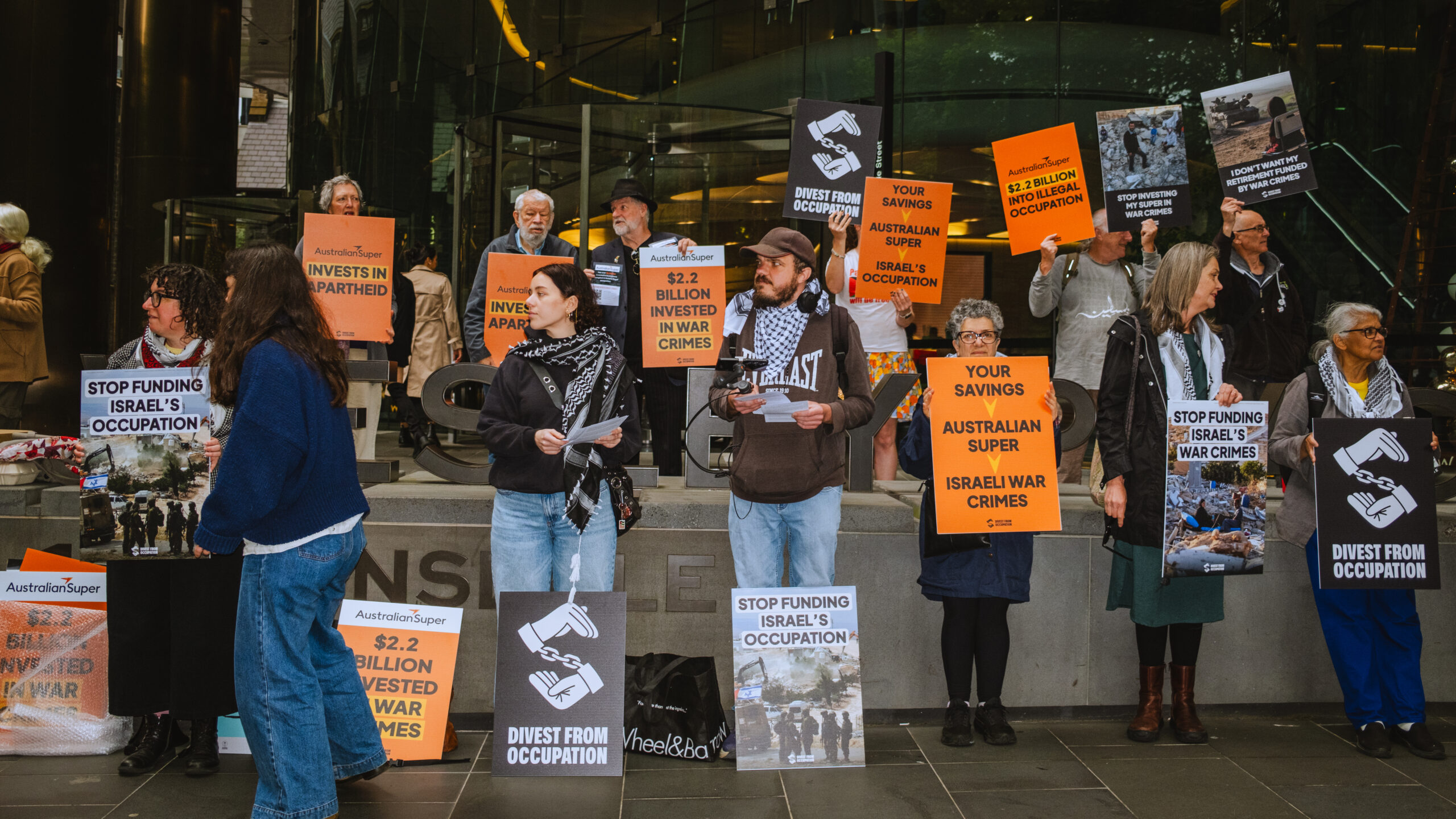Industry fund giants Hesta and Vision Super have cut ties with Israel, standing out among Australia’s large investors for compliance though earning vicious attacks in the Zionist media. Stephanie Tran and Michael West report.
Hesta and Vision Super have weathered an hysterical spate of attacks by Rupert Murdoch’s The Australian in recent weeks, accused of dishonesty, “cosmic stupidity”, being “nut-jobs”, “possibly in breach of the law” and failing to understand the “despicable” Hamas.
All this for simply doing the right thing. Their exit from investments associated with war crimes and the genocide in Palestine comes as Australia’s $4.2 trillion superannuation heads into its annual meetings season with members next week.
Despite the pearl-clutching in the pro-Israel media, HESTA and Vision Super actually stand out in Australia’s investment community for adhering to their own human rights policies. It is their duty.
White phosphorus, blood-red money. Australian Super profiting from genocide
While other large funds including Australian Super and have refused to adhere to their own obligations under the UNGP (United Nations Guiding Principles on Human Rights), in September, HESTA, the fund for health and community services workers, divested from several Tel Aviv Stock Exchange listed banks and from bonds issued by the State of Israel.
The decision followed months of sustained pressure from members, including a petition with more than 3,300 signatures urging the fund to
stop using our superannuation to fund genocide
A HESTA spokesperson said the move was driven by risk mitigation.
“To protect member returns, a couple of months ago we exited holdings in several banks listed on the Tel Aviv Stock Exchange and bonds issued by the State of Israel due to an assessment of higher risk.”
Vision Super followed in late October, dumping its Israeli stocks and bonds, citing the United Nations finding that Israel has committed genocide in Gaza as a critical factor in their decision and the requirement under international law that governments and corporations undertake due diligence to ensure they are not complicit.
The divestment decision follows a two year campaign by Australian Services Union for Palestine.
Jill Sparrow, a member of the Australian Services Union and Vision Super, hopes the decision will prompt other super funds to follow suit.
“Investing in Israel is no longer conscionable. Three funds have now divested. We look forward to the rest of Australia’s super funds finding their consciences and following suit, and we call on all union members to help topple the remaining union super funds,” she said.
Notwithstanding their good corporate governance, the actions of the super fund chiefs at Hesta and Vision Super are likely to encounter further excitable coverage in the pro-Israel press as they face members at their upcoming annual meetings.
In December 2024, Australian Ethical became the first super fund to divest from all companies listed on the UN Database of complicit businesses operating in Occupied Palestinian Territory.
Future Super have also taken steps to divest from companies that complicit in human rights abuses in Occupied Palestinian Territories.
Billions invested in companies tied to genocide
Despite these withdrawals, some of the country’s largest super funds continue to hold investments in companies accused of direct complicity in the Gaza genocide.
Australia’s biggest fund, Australian Super, still holds shares in Elbit Systems, Israel’s largest weapons manufacturer and in ICL Group, a chemicals giant that produces white phosphorus, which Israel has used against civilians.
Australians hold $4.2 trillion in superannuation. Almost every major Australian super fund has exposure to companies complicit in the atrocities in Gaza either though direct investments or through pooled global equities funds.
Yesterday, the Australia Palestine Advocacy Network (APAN) and BDS Australia staged a rally outside Australian Super’s head office.
Molly Coburn, the campaigns and membership lead at APAN, said the organisations have contacted Australian Super multiple times about their $2.2 billion investments into companies linked to Israel’s illegal occupation and settlement regime.
“So far, they have simply washed their hands of us, claiming these investments are beyond their control. But recent divestments by other funds show that that is patently untrue,” she said.
APAN and BDS Australia submitted a number of questions to Australian Super ahead of their annual members meeting yesterday however, the fund declined to address the questions.
“Typically, questions on Palestine are ignored at Australian Super’s annual member meetings, and yesterday was no exception. More than 20 questions were submitted, and not a single one was aired,” Coburn said.
Unfortunately, when it comes to Palestine, both the funds and the government remain willing to turn a blind eye
Double standard
Both the Association of Superannuation Funds of Australia (ASFA) and the Australian Council of Superannuation Investors (ACSI) deny responsibility for providing guidance on investments linked to international law violations.
When contacted by MWM earlier this year, ASFA said it “does not have an industry position on this issue”, while ACSI, despite positioning itself as the industry’s voice on “financially material ESG issues”, said it was “not our department”.
This stands in stark contrast to the coordinated response Russia’s invasion of Ukraine in 2022. The Australian government publicly implored super funds to divest from Russian assets.
No similar instruction has been issued regarding Israeli assets, despite the International Court of Justice ruling that Israel is plausibly committing genocide in Gaza and ordering states to take steps to prevent it.
Hot potato: AusSuper, ASFA, ACSI duck for cover on war crimes super
International law obligations extend beyond government
Legal experts warn that both states and the private sector have obligations to ensure they are not complicit in genocide.
A report by Dr Irene Pietropaoli, a leading expert on business and human rights, found that companies and financial institutions risk violating international law if they continue to invest in or financially support actors involved in genocide.
Her report states:
A corporation or individual businessperson who knowingly assists a State in violating customary international law, including the prohibition of committing genocide, may be complicit in such a violation
It warns that under the Genocide Convention, corporations and their directors could be “held directly liable for the commission of acts of genocide, as well as war crimes and crimes against humanity.”
Former Australian Human Rights Commissioner Chris Sidoti, who served on the UN Commission of Inquiry on Palestine and Israel, told MWM the findings of the Commission put both governments and companies on notice.
“States like Australia, and the private sector too, are now on notice,” Sidoti said. “A UN Commission of Inquiry has found war crimes, crimes against humanity and the crime of genocide, and they have responsibilities arising from that.”
Economy of genocide
In July, UN Special Rapporteur on Palestine, Francesca Albanese released a report detailing how corporations and asset managers, underpin an “economy of genocide”.
The report highlighted how financial institutions, including pension and superannuation funds, fund occupation and genocide via investments in Israeli treasury bonds and companies directly complicit in the genocide.
“The financial sector channels critical funding to both State and corporate actors behind Israel’s occupation and apartheid, despite many companies in the sector committing to the Principles for Responsible Investment and the United Nations Global Compact,” the report said.
“These financial entities channel billions of dollars into treasury bonds and companies directly involved in Israel’s occupation and genocide.”
What can you do to encourage your super fund to divest from genocide?
A number of super funds will hold their annual member meetings next week, giving members an opportunity to question executives about investments tied to the genocide.
The Australian Palestine Advocacy Network have created an email form that streamlines the process for contacting super funds and demanding that they divest from companies complicit in human rights violations.
Sparrow says fund members should use the meetings to apply sustained pressure.
“Going to your super fund’s annual meeting is a great idea. Ask them why they haven’t divested, ask them why fiduciary duty is used as a reason they can’t divest when super funds have exclusions for a whole series of other categories. What makes this different? That’s the question we kept asking our fund. We know you have a responsible investment policy, why can’t this be part of it?”
She also recommends coordinated member action:
“Find out who is on the board of directors and if there are union representatives on it. Work through your union to put pressure on those representatives to vote in line with members’ views on this.”
For Sparrow, the success of the campaign is proof that collective action is making a difference.
“I think all of us that have marched on Sundays or cried at night about the atrocities in Gaza have felt at times like there’s nothing we can do. But all the actions we take are making a difference. We hope the success of our campaign inspires other people to do the same.”
New Future Fund chairman Greg Combet ducks for cover on Elbit war crimes investment


